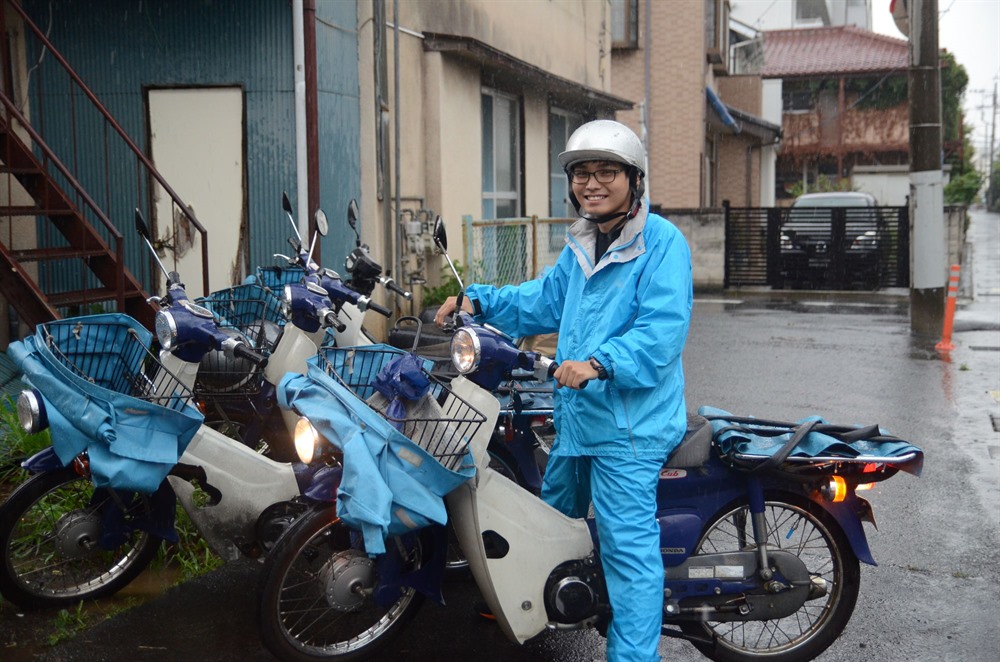 Society
Society

Nguyễn Tuấn Anh, 36, may never forget the hard time he went through as a student before he became a director of a company in Japan.
 |
| A Vietnamese student in Japan works after school. — VNA/VNS Photo Nguyễn Tuyến |
Nguyễn Tuyến
TOKYO — Nguyễn Tuấn Anh, 36, may never forget the hard time he went through as a student before he became a director of a company in Japan.
Anh came to Japan to study in 2002 on a scholarship programme by Asahi Newspaper of Japan. In order to get free accommodation and tuition paid for two years to learn Japanese, he had to deliver newspapers.
The job sounded easy but there were days when Anh had to travel in heavy rain or snow at 2 or 3am to deliver newspapers.
After finishing studying Japanese, Anh applied for university in Japan and was accepted. It also meant that he had to work harder to be able to afford the tuition fee for the four-year course. He tried different jobs, including as a waiter or working in shops.
His efforts eventually paid off. Anh completed his studies and got a job in a big company. After many years, he rose up the ranks and became managing director.
Anh is among examples of Vietnamese students in Japan who were willing to work legally and study hard to be successful.
However, for some other students, the journey is a lot tougher.
Among challenges facing Vietnamese students in Japan are high tuition fees and living costs. It will cost a student at least US$1,000 per month to study Japanese in Japan, including tuition fees, accommodation and living costs, according to the Japan Student Services Organisation. The figure is higher for students studying at university or vocational training schools.
To help cover the cost, students are allowed to work up to 28 hours per week. A student can earn $7-9 per hour.
However, many students want to work longer to earn more money, particularly those whose parents had to borrow money at home in order to help them study in Japan. Many students are willing to work extra time or do two or three jobs.
However, working too much affects the students’ health and it also means they do not have enough time to study. As a result, many students decided to drop out.
Dropouts and price
Dropping out of school to work can help students earn more money. However, the benefit is too small in comparison with the price that they may have to pay.
When deciding to drop out of classes, a student lives in Japan illegally. According to Japanese regulations, students will automatically lose their legal residency status if they are confirmed as absent from school for three months and will be expelled from Japan and not be allowed to come back for five years.
Choosing to live illegally, these students are easily enticed by criminal gangs, particularly those students who want to earn much more money without working.
According to the Japan’s Justice Ministry, more than 3,500 crimes were committed by Vietnamese people in Japan in 2017, of which robbery accounted for 85.8 per cent. Over 1,400 Vietnamese people were arrested that year, of which students made up nearly 50 per cent.
In response to the increasing number of crimes committed by foreigners, Japanese authorities have strengthened measures to crack down on foreigners illegally living in the country. In late 2017, police of Aichi Province arrested 13 Vietnamese people, including students, for illegally residing in the country.
The Japanese authorities are investigating 700 foreign students absent without leave from a Tokyo university, according to Kyodo news agency’s report last week. The students of the Tokyo University of Social Welfare dropped out of classes last April and the school could not get in touch with them.
These students — mostly from Việt Nam, China, Nepal, among others — were living in the university’s campus in Tokyo. They have been cut from the university’s student register, Kyodo reported. The investigation was opened after some of the dropouts were found to have overstayed their visas and similar incidents have occurred in previous years.
The dropouts also negatively affect other students who want to go to Japan to study. Japan has recently tightened enrolment of schools providing Japanese language training. The Japanese Immigration Bureau has recently denied residency applications of 520 foreign students who plan to study at the Tokyo International Exchange College.
In order to enrol qualified students in Japan, the Japanese Embassy in Hà Nội has strengthened interviews of Vietnamese students planning to study Japanese.
Meanwhile, the Vietnamese Embassy in Japan keeps providing information and education to raise awareness among Vietnamese students of abiding by Japanese laws and coordinates with schools in Japan to manage Vietnamese students.
Phạm Quang Hưng, who is in charge of the education section of the Vietnamese Embassy in Japan, said it was crucial to equip Vietnamese students with basic Japanese language skills and knowledge of Japanese laws and culture before going to Japan to study.
Students themselves should understand that studying in Japan was to learn new knowledge and skills, not an opportunity to work to earn money, he said.
The dropouts have negatively affected the image of the country but they are just the flies in the ointment. There are still many Vietnamese students like Anh who tried hard to study to gain success.
As Hưng said, the door to study in Japan is still open wide for Vietnamese students who are studious and have strong will and determination to overcome difficulties. — VNS




